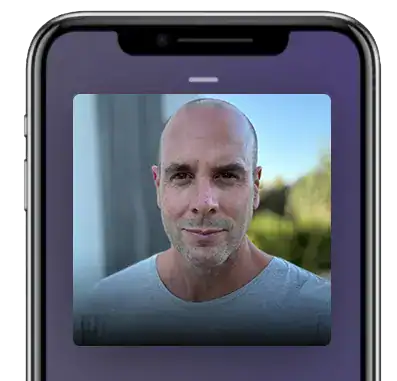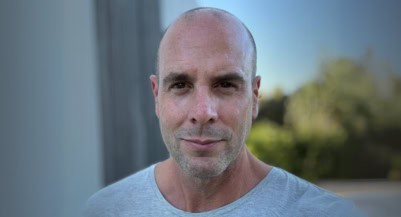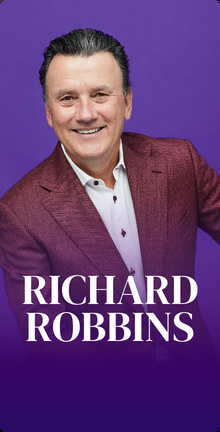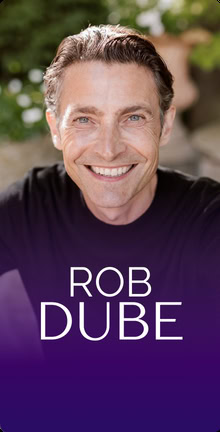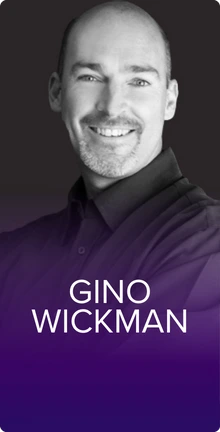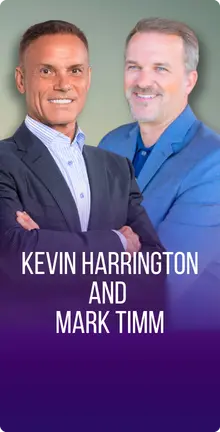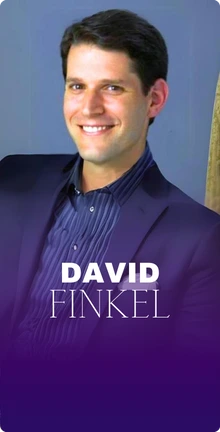In this Episode
- [02:37]James Schramko outlines his hybrid coaching model, combining weekly group calls with private asynchronous support via tools like Loom.
- [04:42]James delves into his experience building GPTs for his team and clients, exploring a range of AI agent applications.
- [07:53]James explores the value of revenue share deals and unpacks the complexities of managing partnerships, including how AI has disrupted some of his ventures.
- [13:44]James and Stephan examine AI’s transformative role across industries such as copywriting, home renovation, and marketing.
- [26:53]James highlights the power of reflection and shares how spending time in nature fosters clarity and renewed confidence.
- [36:15]James recounts a near-drowning experience at sea and emphasizes the lessons it taught him about resilience and readiness.
- [45:40]James discusses his biohacking strategies, including tracking sleep and biometrics with the Oura Ring.
- [60:02]James describes his evolution toward a simpler, more grounded life, letting go of the need to impress and embracing abundance through humility.
- [69:35]James reflects on the beauty of simplicity, sharing his belief that true perfection arises when nothing more needs to be added—or taken away.
James, it’s so great to have you back on the show. It’s been way too long. Episode 21 was your last appearance on Get Yourself Optimized. It was in 2016, if you can believe it.
Gosh, it’s almost a decade, and I imagine there’s been some changes since then.
Yep. One thing that’s changed is that I received several years of coaching from you, which was incredible and very helpful. So, thank you for that. I’m curious, are you still offering private coaching, or is it all group-based?
It’s a hybrid, actually. I’ve refined the business continually. The coaching program that you’re in started in 2010, and the other community started in 2009. They’re both still around, but with slight modifications. I don’t make one-to-one calls, but I do one-to-one asynchronous. I use Loom, voice, or chat as a private sounding board for that level, and we still have weekly group calls. I’ve stripped away almost everything else.
The higher-level tier doesn’t have a peer-to-peer community. That’s a way. They get more bonding, I think, in the weekly group calls, and they sort of learn from and help each other. I love the energy that comes from that. It’s very leveraged. They can still get the async help in between. However, it’s also beneficial for me, as it means about six hours of my life back per week, with no net change in terms of profitability or revenue.
The only person you need to impress is yourself. Letting go of ego and status is hard, but it’s the most freeing thing you’ll ever do. Share on XMy rates have increased slightly due to inflation, and as I continue to improve, which I feel is going well right now, I’m definitely aware of the changes in the industry, especially with AI and its impact on agencies and experts. It feels really good, and it’s just super simple. There’s really only three elements to that level you’re in. There’s a weekly group call, there’s the private sounding board, and then there’s playbooks.
Playbooks were my revised way of consolidating all of my trainings, knowledge, and frameworks, many of which were private, and then distilling them into the shortest possible digest. Lately, I’ve been going through my playbooks, updating them and adding GPTs to them just to help people leverage them. They’re pretty potent.
Oh, that’s a great idea. GPT is added to your playbook. So what’s a use case, for example, with one of your clients using those GPTs?
Let’s say someone wants to have a top-of-funnel presence on social media. I’ve a GPT that generates long-form social posts that can be monetized. I’ve a GPT that generates more authoritative social media posts. I’ve got one that actually utilizes Google’s E-E-A-T formula and similar concepts, and performs an analysis of a client’s website to assign a score from one to ten for each element and how it might be perceived by Google.

I’m sure it is quite low-grade compared to what a professional SEO is doing, but for someone who just wants to get a snapshot, it’s a good tool. I’ve a YouTube script creator, so after answering a couple of prompts, it will come up with a strong hook, outline, and intrigue, or positioning against the grain, that sort of thing. It also has a checklist for optimizing the thumbnail and packaging.
I’ve been really delving more into YouTube over the last year with my surfing brand to learn how that works. It’s been so fun to be a beginner at that and to see what I can learn and where I can take it, and I’ve had some really fantastic things thrown at me from the universe in that regard.
Like what? How’s the universe conspiring to make all your dreams come true?
People are sending me surfboards and fins off the back of my reviews. I only had around 70 subscribers last year, and some of my videos have garnered over 50,000 views. People now recognize me sometimes when I’m out for a surf. I’ve actually been contacted by some of the equipment suppliers I’ve reviewed.
Initially, I just purchased them myself. I gave impartial reviews, but because of my background from the automotive industry, my product knowledge and being able to compare and contrast different vehicle models, it really lends itself to me being able to do that in the surfboard market. They said they really appreciated my review. It was really honest, fair, and impartial, and it cut out compared to all the other reviews on the market.
Doing things for the right reasons becomes more critical the further you go. Share on XSo they said, “Look, if there’s any of our equipment you’d like, just let us know. We’ll send it to you.” Now, I’ve actually got a fin company that is saying, “What would be your dream come true fin? Let us prototype it for you. Let us design it.” I’ve sent them my specs, and they’ve sent me back a mock-up, and it’s got my brand on it. It’s really exciting. I don’t know exactly where it ends, but I’m definitely enjoying the journey.
How many brands do you have now?
I’ve got the surf brand, I’ve got the recruitment business, and I’ve got my personal brand, and I’m a partner in six other businesses.
Talk to us through the partnership model. I know that was important to you in the early days of running SuperFast Business and SilverCircle. How has that become a big, viable part of your own income stream?
Well, firstly, it represents more than half my income, those six. It came as a result of me asking Jay Abraham a question. I said, “Jay, if you went back in time, what would you wish you did differently?” He said, I would have done more rev share deals.” I said, “Tell me more.” He said, “Look, people paid 30,000 to come to a workshop. If I’d done a percentage of revenue deal with them, I could have made 300,000 or $3 million over time.” I said, “All right.” He said, “Look, if you want, I can send you my workshop notes and transcripts, some of them haven’t even been published.” I said, “Please do.” He did.

He’s very generous that way.
He’s lovely. If you can actually get him in a conversation, he’s the best, and some spark connected with us. He was definitely my idol. When I was still in a job, reading those books of his changed my whole view, and he saw that in me. I helped him with something as well. But turns out, I went to the printing shop. I got them all printed out. It filled a whole moving box full of printouts. I read them all.
Then I workshopped four or five other people who do royalty deals, because it’s fairly common in the copywriting industry. It does happen in the software industry. Of course, it happens in the music industry and the book industry. So, there are use cases for it. And I just thought, instead of the client taking all the risk and paying me a retainer, sometimes there’ll be somebody who I think has got the it factor, like if I were a record label, I think they’re like the next hit artist.
I want to take them out into the world and promote them, sharing in their success. Some of the individual partners now contribute on a frequent basis. For reference, a mentor client would typically pay around $1,800 per month as a retainer. Some of these partnerships are cracking $10,000, $12,000, $14,000 per month. Originally, I thought I’d have ten deals at ten grand each.
That would be a good business model. I’m ten years into it. I think I’ve tried fifteen. I’ve sold out three or four. I’ve let go of a few, and then I’ve still got six left. So you definitely gotta learn how it works. They’re not super simple. The idea is very simple. You just take a percentage of revenue to help them out in whatever way you can bring value. But you’re taking a risk. You only get paid if they succeed.
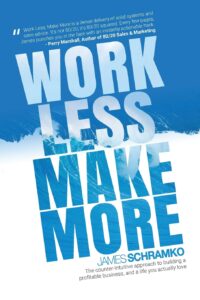
There are sometimes changes. A pandemic, for example, can shift the goalposts if it has a live component, or whatever, and that stops; then that can affect it. Sometimes people change paths, like maybe you have, Stephan, a little bit. They go down a different path than where they started. So their business model moves, and then it’s no longer viable or interesting. One of them is about to be obsoleted by AI.
That’s probably the first business unit of mine or brand that is going to be sunsetted because of it, but at the same time, it’s lifting some of the others. It is quite interesting. It’s not for everybody, and I don’t think many people actually do it, but it’s phenomenally simple. I would likely have the fewest clients I’ve had since starting online, but I’ve the most profit, and I work the fewest hours. I’m also building an asset value because each of those partners has a buyout clause.
There is an asset value being built in the background. It’s a little less tangible, and it might never come to fruition, but if it does, and it happens three or four times, I’ve been paid out, and it’s like selling a fraction of your company. It’s like a fractional business sale. I like building things to sell. I’ve definitely worked that out.
How many hours a week do you work? And I know this is very relevant to your book, Work Less, Make More. Here you are implementing your own model.
I am. I do believe in practicing what you preach. About ten to fifteen hours. My structured group calls, which I commit to every Tuesday and Wednesday, take four hours a week. Then, I can manage the rest of my business in about six hours, sometimes another ten. It just depends. I usually record a podcast a week, but it’s often under an hour. I have tools and a team. I’ve got a little team of five people in the background working for me full-time in the Philippines, leveraging tools as well.
I believe our team of five, with the tool set we have, is probably doing what we used to do with twenty-five people. We definitely wouldn’t need to be hiring anyone, and we’re not letting anyone go. However, we’re in a crossover period now where each team member can become far more productive.
Well, clearly some people are more AI inclined than others, so those who are not, eventually you’re going to have to stop carrying them if they don’t learn the new tools and the new prompting and how to think differently, right?
Well, that’s pretty much the memo we’re getting from all the big companies, isn’t it? I think Microsoft just dumped like 7,000 people this afternoon. Price Waterhouse Coopers, 1,500 people, a few days ago. You got the CEO of Fiverr announcing AI is coming for you. The Shopify CEO sent an email as well. They will only hire AI.
I shared the Fiverr CEO’s memo with a number of people, and I think it’s spot on. The new easy is gone. The new easy is what used to be hard, and the new hard is what used to be impossible, and the stuff that’s relatively easy work is gone forever.
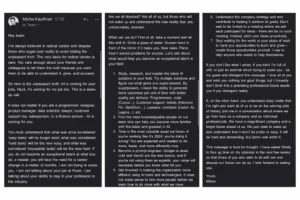
A hundred percent. We hear different generations saying sometimes they miss the golden era of the past, and the easy times it was, the innocent times and so forth, definitely in a very interesting period in life. And to me, I’m getting all the spider senses and tingling, so that I did when the internet came along, it was exactly the same for me. I just knew with every fiber of my body that this internet thing was important. I had to understand it. I knew nothing about it.
I’m not a technical person. I’m quite pragmatic, but I’m not an IT person. But I knew I had to try and figure out how to build a website and how to market online, and now have a very strong urge to understand AI. I’m building GPTs. I’m learning how to make agents. I’m getting newsletters from a dozen sources to stay abreast of what’s happening. And I’m guiding and shepherding the people who I’m working with, and I’m working with people who are in roles that are quite strongly impacted by it.
A couple of use cases that stand out. One of them is a high-level copywriter. I know some people who, for the last five years, have had eye writing copy for them, and everyone’s using Claude now for copy; it’s quite a change. Be the standard, I’d say. The old art of copy will probably be lost. So it’s time for him to tool up and leverage or bunk off that role. And then there’s another one that comes to mind: a renovation company, which is a traditional business.
They’re out there with estimators. They’re going out and getting tenders and measuring stuff up. And then they go back and they spend, like, a week putting together pricing, metric meters of this, and unit basis of that, and they actually have to try and figure out how much to quote for the job. I’ve actually trained some of my clients to build an estimation tool that can do it in minutes, very accurately. We learned a lot from the stock trading market.
We obtained the ones where they’d already spent a week pricing them in the past, and loaded them up to back-test them to see how accurate they were, to gather feedback, and to refine the tool set. That’s like a whole industry. I think the industry of converting people from the old to the new will be a huge opportunity right now.
How would a landscaper or snow removal company need to adapt in this new age of AI that’s coming?
For those people, they might think they’re quite safe, and possibly they are for a while, but I’m sure that Elon Musk, who is making little cyborg-type things, will be after them too. You’d have to imagine that, though. You’ve probably seen the demo video where the humanoid robots unpack the shopping and load the fridge; that would be quite interesting.
That’s like, next year. This is the year of AI agents, followed by human-AI robotics, and then AI superintelligence the year after that. How do you wrap your head around that?
It’s incredible. We’re two years out from way surpassing humans, and then we’re six years out from obliteration.
They’re not getting obliterated.
Some of the other smart people don’t feel threatened by it. Naval, in particular, is not saying there will be great medical innovations and all this other stuff. I do think it’s quite exciting and very interesting. But for the landscape gardener, the painter, or the snow person, I think they would probably have used small teams or marketing agencies; there will be some layers removed.
I think we’ll get more able to interconnect and have things done that if they were limited by tech or coding or a keyboard or being able to deal with an agent, if they will be able to talk, they’ll probably be able to get tool sets around them that can do what they need. They’ll be able to say, “I need to get leads.” And then things will start to happen to connect them with leads. So I feel like there will be some barriers broken down for the people who generally lag behind everyone else on the tech front, you know, like that old person who struggles, like my dad today.
He’s like, “Siri doesn’t work on my phone. I can’t get it to work.” I just held the button down on the phone, and Siri was right there. I said, “It’s there, it’s right there. You just have to hold this button.” He’s, “Oh, really, just have that button.” I’m like, “Yeah, you hold that button.” For those people, it’s going to be a bit harder, but for the rest of us who are already thinking about it, I think this will be very interesting, but there will probably be quite a redistribution of wealth and where things end up.
Yeah, I believe it. What are you doing with AI agents?
Well, not much at the moment. I’m just learning how to build them myself, basically at the point where I’m looking at some of these platforms, I’m seeing what I want to join up or get done more, just sort of coming out of that building GPTs for my team and my clients, and that’s been good. It’s very easy to do that, of course. However, I’ve seen good use cases where people go to YouTube, look for titles, identify gaps, and then create scripts around what’s missing, ready for you to record.
Or ad creators, they go and see what ads are running, optimize your existing ads, or look at your content to see which ones perform the best and then retune them for the new content. I think they’re quite interesting use cases. However, I’m also thinking about the tasks that my team or I might want to outsource for help with. For example, we’re recording this on Riverside, which is a great example of a tool where AI and other features are being integrated to make it very easy for the operator, even if they don’t know it’s there or how to use it.
When you hang up from a call, it’s already generated the title and the bullet points and the chapters and the transcript, and it can do smart edits and fix the sound and everything, or you can redo parts of the audio if you want. That wasn’t really here a year ago for us; it replaced about three tools, and it saved my team hours by moving to this platform.
It’s really cool. I love Riverside and this idea of AI agents taking over jobs. I see this happening in just months, not years, not even a year, but months. For example, in the Marketing Speak podcast, I interviewed Lior Weinstein. He’s really into AI. He explained how he has taught clients and friends to achieve inbox zero and maintain it with their email using AI agents to manage the inbox, rather than relying on an assistant, such as an executive assistant.
So then, people like Yaro Starak have to watch out when they’re doing human email support services. I do use agents in the form of ready-made, off-the-shelf ones, like Manus, for instance, if you want to go on a traveling trip. It’s fantastic for researching where to stay, what to do, and building your itinerary, and you can watch it. It goes and starts clicking on links, compiling stuff.
I’ll send it off to go and check my testimonials page on Trustpilot, then check it on my offer page, and then come up with suggestions on what would be appropriate lead magnets to help people get the results that I’ve already helped people get and where I can tune my offer and come up with campaigns. You can take all that information and then load it up into whatever else you want, like Claude or GPT.
You can start punching that into outputs, and then very quickly, you can end up with a teleprompter script that you’re putting to camera, and then it’s up on YouTube or the website the next day. The time that it takes to do things and the ease with which you can do them are much quicker. Another specific use case that has hit home for me is that, for the last 15 years, I’ve taken notes on every one of my mentor calls.
When you stop chasing and start appreciating what’s already yours, that’s when life shifts. That’s the real breakthrough. Share on XIt used to be Evernote, but now it’s the Apple Notes app. I always thought, “One day I’ll be able to use this information.” And now I can log into my Zoom account, I can get download all the AI summaries from the last, whatever, 60 days, and then put it into something like NotebookLM, and I can get it to look for themes and patterns of the things we’ve been talking about, and it categorizes them all. And I can come up with episode outlines.
I can come up with 25 social media posts. I can ask it based on this: what would be an appropriate series of episodes, or who else should I have on the show? And it’s really quite useful to have all that data and to be able to manage it at your fingertips, where it would have been possible before, but it was much more difficult, and it took way longer, and so you probably end up not doing it.
So you mentioned NotebookLM and Manus, which are actually Chinese-owned.
Yes.
I don’t use Manus. Additionally, it’s challenging to access if you signed up for the beta, and if you hear anything back, you probably won’t receive a response for quite a while. I’m curious, why use a Chinese AI? Not that I’m against China, but I’m against the CCP, so I don’t like what they stand for. I also don’t want to feed my material to the CCP, which is why I don’t use Manus. I’m curious to hear your thoughts on that.
I’m not too worried about the CCP knowing my travel trip/agenda or finding out about my sales offer. I’m not totally against made in China. I mean, it’s pretty hard to deny they’re a massive superpower. They consume a lot of raw materials from Australia. We’re still using all their iPhones and computers and lights and sneakers. Like, seriously, almost everything’s made in China, and someone from the automotive industry is watching companies like BYD come and just destroy Tesla.

They’re kind of undeniable as a force. For me, I’m just intrigued to learn how their tool works and to observe what it does. I also tried a few queries in DeepSeek, and it was interesting to see how that might be slightly tailored to the messaging in there. GPT, I think, charges $200 a month to have the same operator availability that Manus does, at least a few searches for free, and then you just buy credits. That’s like a whole paradigm shift.
DeepSeek came out, and then Mesh came out. There were like two Sledgehammer blows to OpenAI. I am tool-agnostic. I think because I’ve spent so much time communicating in real life with actual humans on the showroom floor in life, having 70 team members for decades, having done God knows how many calls. I mean, I’ve done over a thousand podcasts. I’ve done thousands of coaching calls.
I seem to be able to get what I want out of the tools fairly easily in terms of the way that I’m communicating with them. And I’m just trying the tools. Perplexity is great for research. Manus is very good at going off and doing what a VA would take days to do in minutes. Grok is really good at coding simple things really quickly. Claude is probably the best copywriter. NotebookLM is fantastic at breaking down legal contracts, prospectuses or a book into really easy-to-digest nuggets.
GPT is fantastic for organizing projects and for being able to tune the memory and retain that sort of second brain, or, I guess, it’s almost a third brain now, and to generate little GPTs. I’m using different tools in various ways, but I do get the sense that we’re in an era reminiscent of the pre-Google dominance, when services like Ask Jeeves, Mozilla, Netscape, MSN, and Yahoo were prevalent.
I feel like many of these tool sets will change, disappear, or get wiped out. That’s why I want to be more agnostic about the tool. I’m not a die-hard Manus fan. I’m just saying it’s the best preset operator I’ve used, but now I’m interested in building my own.
And you mentioned earlier that your spidey senses are tingling. It’s not just about the industry and the time we live in, but isn’t it also about using your spidey senses to determine which tools are going to be the big ones, or, I don’t know, which cryptocurrencies to invest in, and all that sort of stuff? Like, aren’t you using your connection to that still, small voice to help guide you on which rabbit holes to go down?
If you distill it all down, few of the actions that we do actually matter, but they get the most outcome; the leverage is there. I put a lot of time, thought, and reflection into deciding which moves I want to make, and that’s true for people like Warren Buffett when it comes to investing. Naval Ravikant is a big fan of reflection as well. That’s why I’m enjoying having the most time off. It’s not that I’ve turned my brain off or that I’m just gorging on Netflix.
If you distill it all down, few of the actions that we take matter, but they yield the most significant outcomes; the leverage is there.
I will walk through a national park, clamber over some wet rocks, dive into a surf break, surf some head high waves for an hour, and then reverse the trip back. It’s like a three-hour round trip through nature analog, and it’s fantastic. I feel alive. Plus, in Australia, you’re kind of dodging all the spiders, snakes, lizards, and everything else that’s out to get you, and God knows what’s underneath the surface in the water.
But I know there’s a resident Tiger Shark where I surf, and there are also turtles, dolphins and stuff. I feel like that reflection time is when things come to me and I get a lot of clarity and confidence around what moves I want to make, and you don’t have to make many moves, is the short answer. Also, I’m not a big gambler. I don’t buy lottery tickets. I don’t do altcoins or whatever.
The only crypto I hold is Bitcoin, because I’ve had a few clients who I think make a lot of sense, guide me in that regard, one of them in particular, who’s got lots and lots and lots of Bitcoins. Every time I coached him, I’d get off the call and buy more Bitcoin. He retired in his early 20s, and he’s done a lot of studying and research on it, and seems very knowledgeable on it. So for my wild card bet, I’m just keeping it very simple.
I used to sell Mercedes-Benz, and I dealt with some very interesting entrepreneurs. Some of them, for example, would rent their house and put all their money in the stock exchange, but all that money would be in just two stocks. They weren’t really diversifying or having an even bet on everything. They knew exactly where the value lay, and they would simply sit on it. Actually took a lot of discipline not to be too active. And that’s quite an interesting dichotomy with the current sort of Snapchat, TikTok generation. To be able not to do something is a lost art.
Yeah, to get quiet and just be with yourself, with God, with the stillness, is really, really an essential and lost skill for many.
I just feel very grateful that I’m the generation I am. To be able to grow up without a mobile phone was just such an awesome thing.
I interviewed John Ratliff. My listener who just heard the story last week will just really resonate with this, and I’d love to tell you about it. What’s happening here is truly miraculous for John and his daughter. His daughter was facing a lot of mental health challenges, depression and so forth. She had Lyme disease, and she became so non-functional that she couldn’t even walk.
Your environment will have a knock-on effect on everything.
What turned her whole life around was the secret sauce, which is actually inspired by Steven Kotler, and it was kite surfing. Have you heard about the story of Steven Kotler and his Lyme disease and how he couldn’t walk either? He tried everything, and then he got this crazy idea somehow to try surfing. He was dragged onto the beach because he couldn’t walk. He put on the surfboard, and then he surfed.
He was able to get into a flow state and to heal his Lyme and to become completely functional and healthy again by surfing continuously all the time. That was his healing modality. And for John’s daughter, it was kite surfing, to the point where not only can she walk and she’s happy and functional and high performing, but she is one of the top kitesurfers in the British Virgin Islands.
She just got a job working at Necker Island as one of the coveted jobs, being a kite surfing instructor. This is just a few short years later, after it seemed like the bottom of her life, with no way out, and she had tried so many things, nothing worked.
I haven’t heard about him, but I know there are surf therapy groups for people who are depressed and so forth, like there are horse handling type groups. It doesn’t surprise me at all, because everyone I know who surfs or especially kitesurfing, they build resilience, even if you think of it on the most basic level, our body’s mostly made up of water, and we’re just, I don’t know was something to do with alkaline or whatever, but we’re getting into that salt water.
Something magical happens. I tell you what, if you see a rainbow and then a couple of pot of dolphins goes past you, you feel like you’re connected to some other force, that’s not even earthly. There’s actually an expression: you’d have to be a surfer to know the feeling. It’s not something you do, it’s who you become. One of the things that attracted me to surfing in my early 40s was just living at the beach and going to the local surf shop for my avocado and coffee, and seeing their surfboards, which looked like lollipops.
They’re all beautiful colors, and they were just like the art and craft of them. But the people were so grounded, earthy, resilient, and practical; they didn’t have egos, and they were generous and supportive. There is a whole community. That’s what I think is happening for me with the surf channel. When I was going into the surf on Friday, this guy was in his late 60s. He just looks across and says, “I love your surf channel, by the way.”
I’m like, “Oh, really, what do you like about it?” He goes, “I just like how down-to-earth you are. I can see it’s really improving. Keep doing it, mate. You’re doing a good thing for the sport.” Another topic that I handled, which may not mean anything to people who don’t surf, is about channel bottom surfboards. A lot of people like channel bottom surfboards. Most people don’t know why they do what they do and how it works. So, I sort of took it on to explain it.
Then, I got a comment from a guy who’s like the Jay Abraham of surfing. He’s like the icon of icons. He’s got a surf shed with thousands of surfboards, and he commented on it. He said, “This is the best explanation I’ve ever seen for channel bottoms. Well done.” I’m like, “Oh my God.” I’ve had a couple of moments like that. There is some connection with it. I would encourage people, but again, on a practical level, the vitamin D.
When you get all the permission to move forward with love and safety, then you can achieve amazing things without having to fight your inner voice.
My skin cancer doctor, whom all Australians pretty much visit every year for a checkup for skin cancer, because it’s so common. He said we’re photosensitive, and that means the more light you get exposed to, the more your body adjusts to it. I’m in Queensland, Australia. We’re all in the sun a lot and out in the fresh air. We’re surrounded by national parks. There are forests absolutely everywhere, producing fresh oxygen. It’s actually a world-protected surfing reserve.
It’s very hard to describe, but it’s kind of hard to be unhealthy. You’ve got all these local hinterland farm produce, high-quality dairy, unmessed-with food, locally produced, grass-fed beef, and all this sort of stuff. Your environment is going to have a knock-on effect on everything. So yeah, I believe kite surfing is one of the most difficult sports.
You have to you’ve got to know how to sail, you’ve got to have good balance, you have to be strong and fit and resilient, and you’re going to get messed up pretty bad when things go wrong. My friends who kite surf often get stuck a few kilometers or several miles off the shore with the kite in the water, and they have to paddle back with a kite surfing board, which is kind of like a snowboard. It doesn’t have a lot of buoyancy. It’s pretty gnarly.
That’s wild. That reminds me that, according to Steven Kotler, I think, there are twenty-three flow triggers, and one of them is that your life is at risk.
A hundred percent with that one.
So, if you’re hella skiing, for example, and one wrong turn and you go off a cliff, and that’s it. You better be fully in flow.
I came very close to an incident in December in the Philippines. I kind of got swept out to sea without my surfboard, and I was in a life-and-death situation. I can tell you, when you get back to dry land, they’ve got a lot of adrenaline flowing. When I checked my Oura Ring on the app, my pulse went to 165 beats per minute for about six or seven minutes, until I could calm down enough to just get it under control and make my way back to the shore.
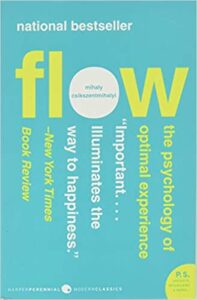
I just swam back through a rip in overhead high surf with whitewash. There’s no rescue, backup, jet ski, or surf guards. I was one of two or three people out. It was too big for everyone else. There’s no one coming to get me. It’s like, survive or you’re dead. So I can totally resonate with that. And often when I catch a big wave, I’m paddling into a wave that’s a bit scary, and I finish the ride. Just for context, the longest sort of rides that I’ll get are about 450 meters.
So I don’t know how many yards that is, but it’s hundreds of yards, and you’re getting up to speeds of sort of over 40 kilometers an hour, which is probably about 26 or 28 miles an hour, something like that. My legs actually shake with adrenaline as I’m paddling back. It turns it on. It does switch on that adrenal reaction of survival and fight-flight, and when you walk back home, it’s tremendously satisfying that you’ve survived.
You’ve done this resilient exercise walking back through the rainforest by yourself. A lot of the time. As it’s getting darker, you just think all these little couch potatoes, snowflakes, whinging about life, they should be doing this, and they’re going to have a different outlook on everything.
Yeah, well, how do you harness that? That’s the whole point of getting into flow. Have you read the book Flow by Mihaly Csikszentmihalyi? Or Steven Kotler’s book?
I think I have got it on the bookshelf. The guy who took me to the Maldives ran a business called Flow State, something like that. He’s the guy who introduced me to the concept of ikigai, which I made a video about, and it garnered 50,000 views back in the day. It was also copied many times. I do get it. Basically, the life that I have now is so very different from the life that I had as an employee working for somebody else, up to 2008, I can’t even comprehend.
It is so wildly different, and I’m also tapping into new dimensions that I haven’t really bothered about before, and I’m especially talking about gratitude. I always thought that some bullshit thing that people journal with, like cross legged in a hut, but now I get it, if you can be happy with what you’ve already got that is like this. It’s a next-level thing, and that’s been a big epiphany for me.
You indirectly led to a big epiphany for me by just randomly making a book recommendation that happened to be sitting on your desk at the time that we had a coaching call. It was the book called Ho‘oponopono: Your Path to True Forgiveness by Dr. Matt James. And what I had not understood before is that Ho‘oponopono is a Hawaiian prayer of forgiveness, which is simple.
It’s just, “I’m sorry, please forgive me, thank you, and I love you,” and you can expound, of course. You don’t just say those four things. You expound on that if you want, but you can heal so much more than just a broken relationship with that. So let’s say that you had, heaven forbid, an important person in your life pass away. This was actually in the first chapter of the book.
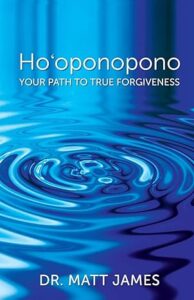
In the introduction, Matt’s daughter’s best friend had passed away. They’re little kids. They’re like six or seven years old. His daughter stopped eating, and she just crippled by grief, and Ho‘oponopono healed her, opened her even though there was nobody to talk to. Those four statements were incredibly healing, and that epiphany for me was a game changer, because I was able to apply the principle of Ho‘oponopono to all sorts of additional aspects of my life that I hadn’t before.
I think the most important relationship that has to heal for most people is the relationship they have with themselves. And I’ve gone pretty deep with that, especially lately, I keep getting brought back into the sphere of Jaemin Frazer, and his work resonated the most with me, especially how he explains that a lot of the popular culture gets it wrong and why it’s damaging to get too caught up in things like fighting that inner voice and doing discipline and hardcore cognsy, Navy SEAL type stuff is toxic.
In his work called Leverage, he talks about apology and getting back into your own good books. And also, if there’s anyone you love, or they love you, then there’s a way forward to be able to heal things. And probably one of the biggest things that he talks about is that you can actually change other people. And most people think that’s a taboo thing, that you shouldn’t change someone. However, he cited a survey by General Electric, I think it was LG, that 30-something percent of spouses rate the other person as the most annoying person in their life, which is a tragic number when you think about it. No one gets married expecting that. So, probably a change has to happen for things to sustain.
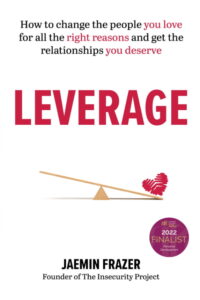
But the thing is, it makes total sense, because who do you drop your masks off with? Your spouse. No one else gets to see the real you, all your demons, all your ugliness, is shown to your spouse, and they’re going to either be a mirror for you or a magnifying glass.
I don’t think even the spouse gets the full picture. I think starting with yourself is the most important thing. A lot of people lie to themselves. They’ve got a narrative with their inner voice that’s not working well for them and getting them the results they want. And he talks about it in terms of our inner voice being like a safety officer. And if they think it’s not safe to proceed, they’re going to sabotage you from moving forward.
It’s not someone you have to fight with, it’s someone you have to fall in love with. And when you get all the permissions, it’s called The Self-Permission Method. When you get all the permission to move forward with love and safety, then you can achieve amazing things without having to fight your inner voice. And that was a big aha for me.
A game-changing book for me, in terms of my relationship with Orion, my wife, is The Garden of Peace, which is by Rabbi Shalom Arush. It’s an incredible book. This is probably the book I would recommend for anyone who wants to improve their relationship with their spouse or significant other. Incredible.
That’s a broad range of the population.
It’s really, really good. Now, I know we’re kind of running out of time here, so I want to hit a few more topics here.
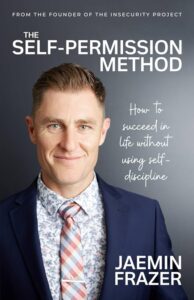
Yeah, sure.
Now, have you ever had any kind of psychedelic experience, or out of body experience, near death experience, anything that you would consider to be extra sensory or outside the norm, kind of paranormal?
I don’t think I’ve had a near-death experience. I had the lost at sea experience, but I was definitely wide awake in that one. Don’t take psychedelics. Probably took ecstasy once in my twenties to try it, but I just felt huggy. But what I do get on a fairly regular basis is premonitions. I have an overwhelming sense that I’ve already been in this moment before on a fairly regular basis. And I’ll just put it down to one word, which would be “knowing.”
I just know things, I’m not guessing, or whatever, but it feels so familiar and confident to me that I just know it. I often will step outside of myself, and as people are saying things or things are happening, I’m just thinking, “Gosh, this has already happened before,” so I don’t understand why that happens, but I do know that as I’ve worked a lot on my biometrics and my sleep habits, I’ve been able to start extending my deep sleep a little further.
I was sleeping really well and getting a high sleep score, but my deep sleep was quite short. I’ve been able to get it longer and longer, and I think that’s maybe taking me into new chapters.

Oh, cool. So what was the biggest biohack, or whatever it was, that sleep hygiene thing that got you into more deep sleep?
Getting an Oura ring helped me get a sort of overall catch, things like knowing if I’m pushing it too much or not, and getting in enough exercise so that I’m genuinely tired; it’s easy if you’re surfing on a good surf day. I’ll rack up 27 kilometers, equivalent to that. Magnesium powder, I take that at night, last thing before bed, it’s just like a knockout potion, seriously, and I can track the difference on my Oura ring.
Having it or not having it will change the quality of sleep I get, and I’ve got all the other factors locked down: a dark room, no tech, and a nice, cold temperature, going to the bathroom before bed, and I usually have a hot shower. You can wear blue light-blocking glasses at night, but I don’t need to do that; it doesn’t make any difference whether I have coffee or not. I’m not affected by caffeine like that.
Obviously, no alcohol. Alcohol is the number one sleep disruptor. If I drink alcohol, which I rarely do, it will decimate my sleep. Even if I had one glass of red wine, it would be like I had been punched in the head the next morning, like a hangover. This is a very noticeable negative.
That’s really good that you are clear on that, because many people are blissfully ignorant of the ramifications of alcohol on their biology, of having alcohol. I mean, it’s called intoxication for a reason. You get toxic exposure.
Well, my friend James Swanwick calls it attractively packaged poison.
I actually had him on my podcast, by the way, a few years ago, talking about Swannies and sleep hacks.
Well, he started that and his No Alcohol Challenge at the same time. However, the alcohol one has been the big one, a substantial business. He’s still a client of mine. They do seven figures a month. It’s such an in-demand product. This generation now drinks less than any other generation, which is really good, and it’s probably going to be like cigarettes or asbestos in the future, like people will be aware that it’s really not a good idea to drink a lot.
Alcohol is the number one sleep disruptor.
I see people who are attached to drinking as a culture, so it’s obvious to me how it’s not helping them, but it’s not obvious to them. So, a friend of mine has been publishing on Facebook. Then he published in a newspaper how he was overdrinking at corporate functions and dating too many of the employees. He ended up getting booted from his own company, and it really went downhill, and it probably stemmed from that being a massive contributor to it.
James’s website is alcoholfreelifestyle.com.
There you go. One of the big things they did that was interesting is they did a university peer-tested study and got like a 99% success rate or something—it’s statistically validated, peer-reviewed, proven beneficial—not to drink. Typically, the people who do not want to drink are not just like full-on gambling alcoholics; they’re just like business executives who want to have a clear head.
So, for me, when you ask me, what helps me sleep better? No alcohol is a minimum standard for better sleep, and magnesium is like the optional top-up. That is a measurable difference for me, and getting enough sleep. I didn’t use to do this at the beginning of my online career because I had a day job, and I was doing it at night. I used to go to bed at two or three in the morning, and then wake up at 6.30 or 7. I had been getting insufficient sleep for several years.
When I quit my job in 2008 and went full-time online, I kept my 2.30 bedtime and started waking up at 9.30 or 10 in the morning. I thought, as a night person, that with the help of the Oura, it turns out I’m a morning person. I wake up at about six, and I go to bed about nine, so I’ll get eight to nine hours of sleep. It doesn’t matter what I’m doing at night; if I get to the cutoff time, that’s it. I’m just gonna hold the computer or whatever.
As I’ve grown older, I’ve become increasingly aware of the importance of health and fitness, paying more attention to these aspects than I did even ten years ago.
However, as it turns out, I’m not using a computer that often, and I don’t even come into the office for about five days a week. I’m usually only in here on Tuesday and Wednesday, and by the time I get back here, it’s like I’ve had a whole holiday in that week.
I feel very privileged to have you on the show because one, you’re in your office, and two, you’re almost at bedtime. It’s after 8 PM right now for you.
I’m basically within the one-hour window of the wind down. And there’s one night of the week, on Tuesday, when I have an eight o’clock call for my mentor group until nine. It’s always on Wednesday that I get the lowest sleep score of the week. And then by Thursday, I’m caught up. I’m usually getting, like, a crown on the war, like in the 80s or 90s, and I go for the triple crown.
As I’ve grown older, I’ve become increasingly aware of the importance of health and fitness, paying more attention to these aspects than I did even ten years ago. Doing things like strength training twice a week has made a significant difference in my life. It’s removing vanquishing back pain. It’s improved my surfing, as well as my general quality of life, including things like carrying shopping or getting through a busy day.
I don’t need to sleep or worry about anything else. It’s like I’m just so much stronger and fitter than I’ve been in my resting pulses are lower, and all my biometrics are much better than they were before I was doing that sort of stuff. Strength training is a really critical thing to build into your routine at some point.
Strength training is a crucial component to incorporate into your routine.
I agree. I’m proud of you.
Oh, thanks.
The premonitions and the knowing, and you were saying, I don’t know what this means. I forget what your question was, or kind of like, maybe it was more rhetorical, but what popped into my mind when you were saying that is that this is actually the past, and I learned this concept from Sam the Illusionist. I had him on this podcast several years ago. He’s popular on YouTube.
He’s based in India, and he’s a trance channel, so he’s in a trance state, sleeping, and his body gets taken over. His vocal cords get taken over. Like, Esther Hicks and Abraham Hicks. Sam, in one of the channeling sessions, the entities speaking through him could have been Archangel Michael, the Arcturians, or some other entity. I don’t know. I don’t remember who it was, but I remember the feeling that this was true.
It’s quite a simple concept. We are living in an echo. We’re living in the past, not the present moment, and the past fools us into thinking it’s the present moment, because we’re so reliant on our five senses that we get kind of sucked into the illusion. But if we want to be in the true present moment, we actually have to shut off our five senses, close our eyes, get in a quiet place, try to be undistracted and go inside.
When we’re inside, when we’re connecting with the infinite that’s within, that’s the present moment. So when you’re getting premonitions of, “Hey, this has already happened before.” One nuance to that, or kind of partial explanation to that, is that this actually had already happened. It’s like that scene in The Matrix Reloaded movie where Neo is talking to the Oracle. She’s sitting on a park bench.
In this scene, Neo is offered the candy by the Oracle, and he’s about to take it, but he’s like, “Wait a second, you already know I’m going to take the candy. Why did you say, “Would you like a candy?” You know I’m going to take it.” She’s like, “Yeah, that’s true. I’d be a pretty bad Oracle if I didn’t know.”
He’s basically asking this existential question, like, “Why am I even here if I already made the choice? She’s like, “You’re not here to make the choice. You had already made it. You’re here to understand why you made it.”
Gotcha. It reminds me of something my grandfather used to say. I spent a lot of time with him as a kid. We’d sit out in the backyard, and he’d look up at the moon, and I’d say, “Could you believe that, like, man actually went there?” Because there’s no way that we would have thought that when I was a kid. But he said, “Look, everything’s written in a big book.” It’s almost like a perfect description of the thing you talk about, like being able to look up your future.
It’s also like when I look at the local surf cam, they started at a time in the past, and you can scroll forward to the present. That may be the very closest metaphor that I can think of to what you’re describing. If our current senses are picking up the past and we’re not in the future, it’s also like if you tune into a Formula 1 race, but they’ve already started twenty minutes ago, but you choose from start versus from live, you’ve got the option to move forward to the live. Do we have the option to move forward to the current?
Yeah, by going within, not from your past, because this is what serves you, is my understanding. So if you think about it, like everything is already written. The whole movie script has already been created for your movie, your life. But you get to choose a different version of the movie script, because there are many different variations, many different timelines, and it depends on your vibration, your frequency, whether you are compatible with a more enjoyable, more benevolent, full of blessing kind of timeline.
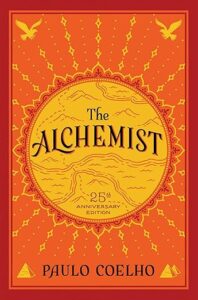
I mean, everything is ultimately for the good. So even if you go through a really rough patch, you’re still getting what you need for this video game or movie called reality. So basically, with this idea, it’s called maktub in Arabic, which means it is already written. I learned that from The Alchemist, which is a fantastic book. It’s actually in the Quran maktub. It’s already written.
How can everything be already written, and yet you have free will? Because you get to choose your vibration and then get a different movie script depending on how you want to align with the creator’s will. That could be another way to think about this idea of everything is already in the big book; it’s just we’re getting to experiences as if it’s fresh and new and never happened before, perhaps.
So what do you do with that information? You just work on your vibration?
Yeah, all the time. I’m working on being in alignment with God’s will at all times. I mean, I forget, but hundreds of times a day, I will course correct, like an airplane that’s going from New York to London, course corrects thousands of times during that flight so it gets exactly to London and not a little bit off course, and ends up in, I don’t know, Paris.
It’s very much like Maxwell Maltz’s Psycho-Cybernetics, the server mechanism. Yeah, we like it. He uses the same metaphor that we can use our unconscious subconscious mind to program it to guide our conscious mind. We’re making those adjustments all the time like a guided missile. Basically, whatever we program our subconscious, it seeks, which explains the poor programming that people have had from parental figures and whatever bad news sources, they end up getting it.
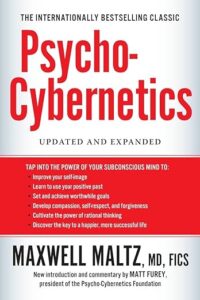
But if this is true, that it’s already written, then that’s already part of your movie script that you signed off on. Like, “Okay, I’m going to get access to these bad news sources, and I’m actually going to get sucked in down these dystopian rabbit holes,” or “I’m going to get bad programming from my parents, and I’ve signed up for that.” But in the end, it’s going to be for my highest good.
During it, it feels like hell, but at the end of it, I wouldn’t change a thing because it made me who I am: incredibly resilient, anti-fragile, compassionate, loving, kind, patient, and all those things that I was forged in the crucible.
There you go. It’s like Jaemin Frazer talks about choosing our suffering. You’re going to suffer, but you could suffer because you didn’t get something, or you can suffer because you did the work to get something. You choose your level of suffering.
And you can be grateful for the suffering because you know that there’s a bigger picture, and there is a blessing in it.
And that fits well with the yin-yang, which is what my other grandparent taught me. You can’t have light without shade, or shade without light; they are interdependent on each other, and they’re encapsulated as a whole.
And the contrast is essential, so that you can appreciate the good, the sunshine, the blessing, that is the obvious blessing, because you can contrast it.
You choose your level of suffering.
Like the person who inherits a lot of money, and they’ve lost context or grasp on reality, they’ve got no footing or grounding.
They end up worse off than before they had the money.
Almost always. Like the guy who got 2.6 billion or something selling Minecraft to Microsoft or someone and bought a $70 million home, and then he got depressed and went reclusive and became unhappy. It’s a very familiar story.
So what’s your mindset hack for getting grateful, successful, confident, patient, loving, kind, and all that? What’s your secret?
My mentor taught me to question everything, but I’m trying to get several layers deep on why things are important. On a basic level, I like surfing and I like surfboards, but I’ve slowed down a lot on buying surfboards because I’ve become more grateful with the ones I’ve already got. And so I created a little checklist before I buy a surfboard which one will I replace? That’s like, “Oh, hang on a minute. I actually really like the ones I’ve got.
Therefore, what do I need a new one for?” And I’m like, “You’re right. Why do I need it? No, I’ll just pass on that.” And doing things for the right reason, not the wrong reason, has become more critical. I do think in the online space in which I operate, a lot of people are doing things for external motivations and for hollow or shallow reasons that won’t lead them to happiness, and they’re not going to like the contract they’ve got themselves into.
So if you set high expectations publicly, then you now have to live by that standard, and it becomes a bit of a noose. The other one that I’ve wrestled with a lot is my Rolex. When I was in the car dealership, having a fancy watch was a really big deal; it was a status symbol. It was a power play, a recognition. You tell yourself all these things, like, “I bought my Rolex to celebrate becoming a dealer principal or a general manager.” And it’s true.
You can’t have light without shade, or shade without light; they are interdependent, and they’re encapsulated as a whole.
There’s been a wonderful investment. I think they cost $11,000 then, and they’re worth $50,000 now. I probably would have done better with things like Bitcoin, but it’s not a bad investment. But the reality is, it’s just sitting in my safe and I don’t wear it for the last six or seven years, because wearing it is not practical. It’s not good for surfing. It’s like a lure. I don’t want to attract a tiger shark to my wrist. I don’t think it’s practical to wear a $50,000 shiny, flashy watch surfing, so I’m going to take it on and off, on and off, which can be a bit annoying.
I prefer to wear a watch that tracks my GPS speed. Then, if I put it on, I’m actually putting it on so that other people could be impressed with how awesome I am. That’s really a shallow and wrong reason. The only person I have to be looking after is myself, and to let go of the ego and the need for everyone else to know how awesome I am was very hard for me to do, because I was competitive and I was in a status driven industry, and I had a lot to prove as a man, as a father of five, there is a strong urge and testosterone.
You have to prove yourself. It’s so easy to get sucked into the show reels of other people’s lives, the social media b*llsh*t, and to step away from it was such a big thing. And in December, I actually went and unsubscribed from all the Facebook groups, and I let go of almost all the pretend Facebook friends and stuff. I’m basically on a no status drive where I’m not trying to impress anybody else. It’s so freeing.
It doesn’t even matter if someone watches this or listens to the podcast and doesn’t think I’m an awesome person or whatever, because ultimately it doesn’t even matter. And so to let go of that is such a big deal. The other day, my daughter was at a sporting event, and some other kid had a rant about something and said to the other team players, “I hate all of you.” She came at me upset, and I said, “What’s up?” “He said, “I hate all of you.”
I said, “So what’s that about him? That’s his thing to deal with. It’s got nothing to do with you.” I said, “This is none of your business what he thinks about you, or whatever that’s that’s his thing to deal with.” I think there are a lot of fully grown adults who haven’t really got to that. I see some very silly social media examples of fully grown adults who are carrying on like schoolyard children. Still, they’re coming from such a place of lack or such a place of trying to please daddy, or such a place of low self-esteem, that their behavior is not well adjusted.
The only person I have to be looking after is myself.
And I feel for those people, and I hope they discover what I’ve eventually found. It took me a long time, but there’s also a lot to be said for I think I really needed to tick all the boxes to be able to untick them, because I was thinking about this as I was going for my surf, if I woke up at 6.30 to an alarm clock and drove in a little sh*tty car to some factory and drove my forklift around all day, which is what I used to do, by the way, for like $2.70 an hour in 1989 then, of course, I’d want all the stuff I see on.
I’d want to have champagne and travel on jets and go to countries, experience Rolex, fancy clothes, and fast cars. A lot of that stuff. I’ve been so fortunate that I can untick them. However, I think some people miss this step. They don’t untick some of these boxes, and they keep adding more boxes when they’ve already had a lot of boxes. And that’s where it becomes a vicious circle, and it’s actually fairly easy to generate a surplus and to live off way less than you earn, and to be comfortable. And this is the real thing that I’ve wrestled with in the last year. Is it okay to settle?
Well, it’s not settling. It’s being smart and being connected.
It’s liberating to live a humble life with a little surplus, and not worry when you tap your phone for a coffee if it’s going to clear or not.
People are like, “Oh, why do you play so small,” or whatever, or they might not be impressed by you, but letting go of the need to impress others is so liberating and to live a humble life with a little bit of a surplus, and not to be panicked, not worry when you tap your phone for a coffee if it’s going to clear or not. I’m happy with that. I’m very happy with the things I’ve got. I could honestly say that it’s taken my entire life to get to this point where there’s really nothing I would want to change. I definitely wouldn’t want to get in a time machine and stuff it up by changing anything.
Yeah, it’s all perfect, and it was all already written.
What’s that Adlerian philosophy? The reason that was supposed to happen is because it did happen that stuck the evidence, and so therefore it just is. That’s the way it’s supposed to be.
It’s God’s will. Because if it wasn’t, it wouldn’t have happened. You know what you were saying resonated with me, and it’s so apropos, because I’ve been going through the episode of Morgan Housel, the author of The Psychology of Money, on The Diary of a CEO Podcast. Do you know this book, The Psychology of Money?
I don’t know.
Oh, you should check it out. I think you’d really enjoy it. But at least check out the episode where Morgan is interviewed on The Diary of a CEO. It’s incredible. He’s sharing all these stories like billionaires, who end up getting into the money and having success, buy the crazy, expensive, overblown home that they don’t need with forty rooms, and then that’s like, everybody has to do it.
Once they taste success, they want to create the status of it so everybody knows they made it. So, a $24 million home or whatever. And then they realize, wait a second, I don’t actually need this. And hopefully they recognize that. And then they scale back down, some do, in this one example that Morgan shared, forget which billionaire, but he lives such a humble life, and he realized, “I don’t need this stuff. It traps me. It keeps me stuck.”
Oh yeah, you don’t own things. They own you. To be clear, I live in my dream home, and I have my dream two cars in the garage and my dream surfboard quiver, but I don’t post. I never share footage of my home, my family, or my things. It’s not part of the conversation. I’m in a luxurious position to be mostly private, and that’s where I think the line is crossed for me, when parents utilize their children in marketing too much because they can’t consent to that.
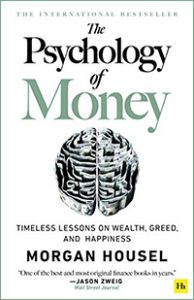
There are any number of YouTube families going through a nuclear war. Now you’ve got to be careful about that stuff. As you and I know, technology can have this habit of retrospectively penalizing you for things like SEO. SEO is a classic. The reason I got into SEO—Did I ever tell you this was because I was an actor on a film set, and I had an IMDB listing for my name, and I wanted to outrank it. That’s why I got into SEO in the very beginning.
The first time I ever purchased was my own domain name, my name.com, and it was for that purpose—to take back control of my own reputation. I wouldn’t have known when I was doing the acting job at 23 that it would be important to me decades later.
But your soul knew.
Of course it did.
That’s awesome. What a great way to end the episode. So, where do we send our listener or viewer so they can learn more from you and get your book and subscribe to your YouTube channel, all that sort of good stuff, where maybe even join your community?
It’s on jamesschramko.com. The first domain I bought ended up being the last domain I focus on, which is actually a perfect metaphor for everything we just talked about. I went through all the complexity to get back to simplicity. My book is on Amazon: Work Less, Make More. I It’s highly relevant, even now, seven years later, since it was published, the concept of it is still perfectly acceptable.
You know, there’s a quote that you’re talking about going from complexity to simplicity. You may have heard this. You probably have. Oliver Wendell Holmes said this, “For the simplicity that lies this side of complexity, I would not give a fig, but for the simplicity that lies on the other side of complexity, I would give my life.”
That’s true. There are several other ones, like “Perfection is when there’s nothing left to take away.” Dieter Rams’ book on design is brilliant. It’s about stripping out as much as possible without taking too much. I freaked out when I got it, because it was in German, but then I checked the other pages in English. It’s one of the best books that offers design philosophies you can apply to lifestyle design.
We dropped a lot of wisdom nuggets and provided a lot of resources.
Thank you, Stephan, too, for the insights. Always learn something every time I talk to you. You come at stuff from such a unique angle that it makes me reflect. I’ve been so lucky to be able to learn from every interaction that I’ve had with you, and also the quality of the resources you bring to people is absolutely stellar. That’s your superpower. Not me, I’m talking about the actual quality people, all the big names and stuff. It’s a great skill.
Oh, thank you. Well, we’re all just instruments of the Creator, so the more you let go and let God, the more that divine, universal, infinite intelligence flows through you.
Love it.
Well, that’s a wrap. Thank you so much, James. Thank you, listener. Make it a great week. We’ll catch you in the next episode. I’m your host. Stephan Spencer, signing off.


